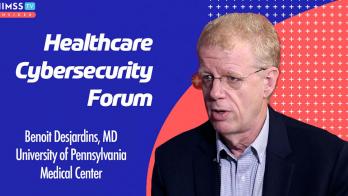Kaiser Permanente exec: 'There is no quality without equity'

Dr. Ronald Copeland and Denise Fair (L-R)
Photo: Oscar & Associates for HIMSS
LAS VEGAS – About 10 or 15 years ago, Dr. Ronald Copeland, chief equity, inclusion and diversity officer at Kaiser Permanente, had a conversation with his colleagues about whether they believed their patients were experiencing health disparities.
His colleagues believed the answer would be no, he told audience members at a "view from the top" session at HIMSS21 here on Tuesday. After all, his colleagues reasoned, their intentions to provide the same level of care to everyone were sound.
However, the data the organization gathered suggested that intentions weren't enough: "We demonstrated that we had disparities breaking out along racial lines."
So, he said, the next question became: What was the system going to do to address those gaps?
As Copeland and other panelists repeatedly emphasized, simply being aware of inequity in healthcare is not sufficient. Change requires collective action.
The need for such change has only been magnified by the COVID-19 pandemic, which disproportionately affected communities of color, especially Black, Latinx and Native people.
COVID-19 "exposed the wounds of racial and economic injustice," said moderator Dr. Michael Petersen, chief clinical innovation officer at NTT DATA Services. "While there were some isolated innovation gains, what remains are persistent, systemic access to healthcare challenges, which continue to negatively impact our underserved communities," he said.
Petersen continued: "In order to truly advance health equity, our industry has to move past the [recognition] of the problem, hashtags, marketing approaches … and bring tangible, meaningful solutions that work toward building health equity, and most importantly, trust.
"My dad always used to say, 'Action, not words,'" he added. "And if not now, when?"
Copeland noted that addressing inequity is a whole-enterprise endeavor.
"Leadership is a critical ingredient in this, but it's not the only ingredient," he said – it's also vital to integrate the mission into employee goals, to hold people individually accountable and to give them the tools they need. Perhaps the most important factor, Copeland said, is to make health equity a formal dimension of quality improvement.
"They are seamless," he said. "There is no quality without equity."
Dr. Ivor Horn, director of health equity and product inclusion at Google, said that those working in health equity have too often found themselves siloed, with limited ability to scale their projects.
"None of us can solve it all alone," she said. "We all have to work together to achieve this goal."
Horn pointed to the role technology can play in addressing health disparities. At Google, she said, the team is trying to ensure they're recognizing the needs of every user.
She pointed to the company's Health Equity Tracker and to its work on YouTube Health, which seeks to surface evidence-based medical data to users seeking information.
At the same time, she said, the company isn't doing what she called the "last-mile work" – making it vital to partner with community-facing organizations and agencies.
One such agency is the Detroit Health Department, where Denise Fair is the chief public health officer. Fair pointed out that relying on technology alone was not going to address the COVID-19 needs of Detroit's 700,000 residents, 40% of whom do not have access to high-speed internet.
"During the middle of a crisis, we couldn't just wait around for the bells and whistles of this new technology product," she said.
The health department partnered with a large mortgage firm to spin up a massive call center, through which any Detroiter could access educational resources and testing.
"Data and science drove every decision we made," Fair added.
Fair noted that the city has hired a director for digital inclusion, aimed at ensuring that any platforms rolled out will be designed with the end user in mind.
As far as a tech wish list goes, Fair said a customer relationship management platform that allows residents to easily connect with information and wrap-around social services would help promote public health in the city.
Overall, said Horn, it's vital to foster collaboration and drive change.
"No organization or industry is going to break structural racism by itself," she said. "The foundation needs to be fixed, and we can't do that in our silos."
HIMSS21 Coverage
An inside look at the innovation, education, technology, networking and key events at the HIMSS21 Global Conference & Exhibition in Las Vegas.
Kat Jercich is senior editor of Healthcare IT News.
Twitter: @kjercich
Email: kjercich@himss.org
Healthcare IT News is a HIMSS Media publication.























